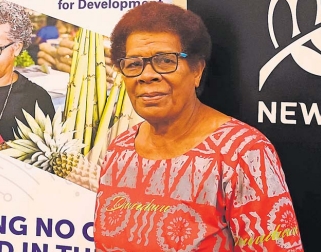FORMER schoolteacher Salaseini Litidamu Koroi of Buabua in Lautoka switched to sugarcane farming when she retired in 2013.
Two towns away, Subamma of Mataniwai in Tavua has been farming cane almost all her life — for over 29 years.
Early this month, the two women cane farmers were among the first recipients of the new scaled up parametric micro insurance specifically designed to suit vulnerable communities — in this case, smallholder farmers — to help provide some form of financial protection for their crops in the event of exposure to severe and damaging weather conditions.
It has come as a lifesaver for the women. With 40 years of cane farming experience between them, they have seen first-hand how extreme weather events inflict heavy damage on crops and cause heavy losses in production and income.
“When my husband died in 2018, I took over the running of the farm,” Ms Subamma said of her eight acres of mostly cane and a bit of subsistence crops and livestock.
“Between 2018 and 2021, there were lots of rain and flooding and I lost everything. I’ve only just started planting cane again.”
She has been on micro insurance for two years now and while not enough to plug the income gap whenever heavy rain or flooding decimates her crops, it has been a big help in starting the farm again.
In Buabua, Lautoka where Ms Koroi lives, the weather is typically hot and sunny most days throughout the year. But not in recent times.
“We retired in 2013 and went into cane farming,” Ms Koroi said of her and her husband Jekesoni, also a former school teacher.
“In 2013 to 2015, we were able to produce a lot of cane but this has been declining over the years because of the weather,” Ms Koroi said.
“Drought is nothing new because it’s a dry part of Fiji. But a new trend we have been noticing is that during the day, the sun may be out but it’s not as hot and sunny as it used to.
“Cane thrives in the heat and sun and that’s what gives it the sweetness. But now, this new weather we’re having on most days with rain-clouds blocking the sun, it’s really affecting our production.
“This year, everyone’s production fell because of the weather that we were facing from last year into this year.
“We plant the same area of cane but cane tonnage dropped significantly.
“And when it does rain, it’s very heavy and our farms get flooded.”
This year, Ms Koroi made it her business to get onto the up-scaled parametric micro insurance as she had been told it would cover for a range of climate events like flooding, drought and even strong winds or cyclones.
“I started with this parametric micro insurance when it was launched in 2021. When it started, the insurance only covered wind. But instead, it was the rain that came that year, so I really like this new upgraded insurance because it covers for all.”
While insurance take up in general is low in Fiji, parametric micro insurance has made inroads into vulnerable communities through collaborative efforts led by the United Nations Development Programme (UNDP), the United Nations Capital Development Fund (UNCDF) with funding support as well from governments of Australia, New Zealand, India, the United Kingdom and Luxembourg as well as other UN agencies and local insurance companies who have come on board as implementing agencies.
Through the Pacific Insurance and Climate Adaptation Programme (PICAP), launched in Fiji in 2021 as a pilot project, parametric micro insurance to protect vulnerable communities against climate change has now been made available across other countries in the Pacific, a region at the front line of climate change.
“Fiji is the first and now it will be scaled up to other countries like Vanuatu, Tuvalu, Kiribati, PNG and others. It will also be replicated globally, which is really important,” UNDP resident representative Munkhtuya Altangerell said.
“Just three years ago, the coverage was only 1000 people but now we have 25,000 households.
“So one household can have one certificate and it protects the entire family.”
In Fiji, the project has been handed over to the Reserve Bank of Fiji who has taken over the mantle of promoting parametric micro insurance to vulnerable communities.
“For Fiji, climate change is an urgent reality affecting our homes, communities and livelihoods,” RBF Governor Ariff Ali said.
“The real concern lies in how climate change impacts the most vulnerable among us — those who are least able to recover from its devastating effects.
“Therefore, our priority must be to enhance their resilience, to ensure they have the means not only to survive but to thrive in the face of these challenges.”



